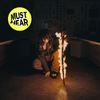Guitar Lives!
The intricacy and immediacy of Chuck Roth’s ‘Watergh0st Songs’

As music journalists, we try to stay on top of new releases, but there are so many of them that sometimes stuff that’s quite worthy of critical attention falls through the cracks. Chuck Roth’s Watergh0st Songs, which came out in January, was one of those albums for me. It’s about as up-my-alley as it could possibly be: a singer-songwriter record that’s also an experimental guitar record, which gives short shrift to neither side of that premise in its explorations of the other. It was released on Palalia Records, the label run by the great avant guitarist Bill Orcutt, who I’ve been a big fan of for years. I’m not sure how I missed it, but I’m glad to have found it eventually, and to be involved in a publication where we’re not so obsessed with timeliness that we’ll ignore a great record just because we’re a couple months late.
I heard about Roth from my friend Colin Joyce, a musician and journalist who performs wonderfully atmospheric, shoegaze-inflected songs under the name Coolant. We were talking at a party about an upcoming show of his, and he told me how excited he was to be sharing the bill with Roth. He shared a few specifics about his music, but ultimately was like, just trust me, listen to this album, you’re gonna love it. I listened on a walk the next day and was kind of overwhelmed at first. Guitar lines arrived in steady streams of sixteenth notes, sweet and wistful or gnarled and dissonant. The vocal melodies were equally elaborate, long and rangy, and sometimes felt like they belonged in entirely different songs from the guitar. It was intellectual music, but also forthright about feelings, with hints of midwest emo in the yearn of the vocal delivery and the twinkle of the guitar.
I knew I liked it, but it was a lot to process. The album had the feeling of a vérité live document, with no production frills, so I decided to wait until the show to listen more. Roth’s performance was spellbinding. He played with no reverb or any other effects pedals, a quietly bold move that gave his playing a thrilling knife’s-edge quality, sharp and unadorned. The set began with a single low note, loudly attacked over and over, for an absurdly long stretch of time—a move that at first seemed punkishly confrontational, and probably was on some level, but eventually took on a meditative quality, as if Roth were plumbing the depths of his E string for all of the resonances he could find. You can hear what I mean in the introduction to the song “Private Boy,” which opens with a similar gesture, drawing your ear toward small fluctuations in the buzz of the string against the frets.
As the set moved into songier material, I was surprised to find myself singing along. Roth’s compositions, for all their intricate polyphony, also turn out to be catchy as hell—catchy enough that they were still rattling around in my head weeks after that initial somewhat cursory listen. Roth is an expert melodic craftsman, but I think the songs’ stickiness also has something to do with that emotional forthrightness. Where other music as challenging as Roth’s can be a bit withholding about feelings in its pursuit of intellectual rigor, I can imagine belting the chorus of a song like “Traffic Light” from behind the wheel of a car, even as the guitar traces an impossibly intricate counterpoint beneath it.
A few weeks ago, a dumb tweet went viral: Something about how we’ve supposedly reached the end of the guitar’s expressive possibilities, how we have conquered it and should leave it for dead, conveyed with the sort of haughty certitude that makes me feel like the writer has spent more time studying Elon Musk’s Wikipedia page than practicing an instrument. This sentiment comes up all the time, in part, I think, because of a funny paradox: the people who are pushing the instrument forward are doing so in ways so far removed from the rock ’n’ roll meat and potatoes that the philistines expect that it doesn’t even register to them as legitimate, if it crosses their radar at all. (And I say that as a great lover of rock ’n’ roll meat and potatoes.) When these people think they’re addressing the state of the instrument, they’re actually addressing their own incuriosity. We in fact live in a golden age for forward-thinking guitar music: If you don’t believe me, try brushing up on the work of Bill Orcutt, Nina Garcia, Wendy Eisenberg, Grey McMurray, Brandon Seabrook, Yasmin Williams—the list goes on. And with Watergh0st Songs, Chuck Roth makes a worthy addition.





